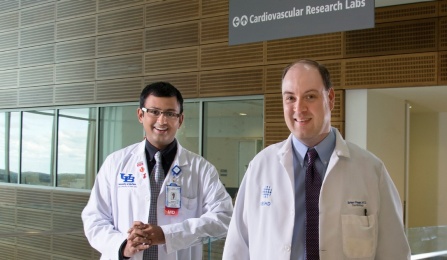
Bharath Rajagopalan, left, chose UB after program director Brian Page told him about the fellowship’s skilled faculty, high procedural volumes and reasonable call schedule.
How to Choose a Cardiovascular Fellowship
Your fellowship in cardiovascular medicine sets the stage for a well-rounded career, so make sure you choose a respected program with the six attributes listed below.
1. A flexible clinical schedule
At this advanced stage of training, you need freedom to begin identifying and cultivating areas of expertise. A quality cardiovascular medicine fellowship accommodates you with a schedule that becomes more flexible as you gain experience.
Winnow down prospective programs by ruling out those that can’t tailor your clinical schedule to your goals while still providing a solid foundation in the field.
2. A high procedural volume
Fellowship training is taxing enough. The last thing you need to worry about is whether you’ll make procedural quotas.
Faculty in the program’s clinical training sites should perform a high volume of procedures. If that’s the case, you’ll never have to compete with your peers to meet procedural requirements — and you’ll likely exceed them, improving both your competence and your confidence.
3. An evenly distributed call system
In many fellowships, your on-call responsibilities lessen as you gain seniority. That system may seem appealing, but it puts junior fellows at high risk for burnout.
Consider only fellowships that distribute your call responsibilities evenly — and don’t require in-house call. This ensures that you’ll develop clinical independence without ever shouldering an unreasonable call schedule.
4. Comprehensive, board-oriented didactics
Your fellowship’s didactics should prepare you to master your certification exam and succeed in practice.
You should have protected conference time to cover core exam topics and present your research.
To sharpen your clinical acuity and currency, a well-regarded program also sets aside time for you and your peers to interpret images, discuss interesting cases and review noteworthy journal articles.
5. Strong mentoring
When you’re poised to launch your career, it’s critical to have engaged mentors guiding your next steps. Make sure your program pairs you with a mentor who can advise you throughout training.
This faculty member should be just one of many dedicated to your success. If you train in a robust academic division, you’ll learn from subspecialists who can teach you the latest interventions. And when you embark on your research project, you’ll have no shortage of opportunities to collaborate with world-class physician-scientists.
6. A comfortable living environment
You’re not only selecting a training program; you’re determining where you’ll live for at least the next three years of your life.
That’s why it makes sense to look to a locale that makes your life easier with quick commutes, affordable housing and — for your well-deserved time off — a vibrant social scene.
Whether you’ll be living with your family, a partner or alone, a city with a strong sense of community makes you feel at home from the moment you arrive.
And if that community also boasts a strong medical school and a growing medical campus?
All the better.





